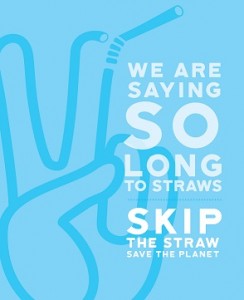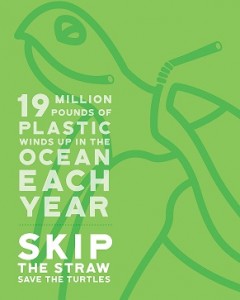Skip the Straw, Save the Planet – NSU Eliminating Use of Plastic Straws

 Joining an ever-growing list of corporations, organizations and municipalities that are taking steps to reduce their dependency on single-use plastics, Nova Southeastern University (NSU) will be eliminating the use of plastic straws, first at it’s Fort Lauderdale/Davie campus, then the other NSU locations.
Joining an ever-growing list of corporations, organizations and municipalities that are taking steps to reduce their dependency on single-use plastics, Nova Southeastern University (NSU) will be eliminating the use of plastic straws, first at it’s Fort Lauderdale/Davie campus, then the other NSU locations.
“This was something we heard about from students, faculty and staff,” said Dr. George Hanbury, President of NSU. “The time has come for NSU to take a first-step in addressing single-use plastics on our campuses. It may be a small step, but every bit helps address the bigger issue.”
Dr. Hanbury hopes that by NSU taking this step, it may inspire public and private sector organizations to explore the possibility of doing so as well.
While NSU will be replacing plastic straws with more environmentally-friendly paper versions, the university will still have plastic straws on hand for individuals with disabilities or special needs who need to use them, and they’ll be made available upon request. The fact is in most cases, straws are not needed – they aren’t the product people are purchasing, they are an accessory. You can still buy a soda or cup of iced coffee and simply drink from the cup – the straw is superfluous.
The campus is home to third-party vendors (i.e. Starbucks) who are also exploring the possibility of following NSU’s lead and switching to paper straws.
For many years the outcry about plastics polluting our oceans has been heard near and far. Almost weekly there are news reports of marine creatures washing up on beaches that have their digestive systems clogged with plastic trash. Plastics have been found in all of the world’s oceans, in the polar ice caps and even at the deepest part of the ocean, the Marianas Trench.
“Many people have said that, in the grand scheme of things, reducing straw usage is just a drop in the bucket when it comes to addressing plastic trash,” said Dr. Derek Burkholder, a marine research scientist in NSU’s Halmos College of Natural Sciences and Oceanography. “While that may be true, the fact remains that plastic straws are part of the problem, so we can start there and then see what else we can do to reduce our plastic footprint.”
a marine research scientist in NSU’s Halmos College of Natural Sciences and Oceanography. “While that may be true, the fact remains that plastic straws are part of the problem, so we can start there and then see what else we can do to reduce our plastic footprint.”
Burkholder, who is also the director of the Broward County Sea Turtle Conservation Program and the Marine Environmental Education Center at the Carpenter House, said there are some reports that show that just in the United States and United Kingdom, nearly 550 million plastic straws are thrown away every day. In fact, approximately 50% of all plastic is single use, with an average “useful lifetime” of 12 minutes.
There are simple steps that people can take to help reduce their plastic footprint. From not using plastic straws to using reusable bags when grocery shopping, each action, no matter how small, helps remove plastic trash from landfills or the ocean.
Working with sea turtles, Burkholder and his colleagues have had to deal with the unfortunate reality of dead animals washing up on our beaches. And when they perform a necropsy he said that, inevitably, they find various bits of plastic in the turtle’s stomach.
Burkholder said it’s not just sea turtles – plastics are finding their ways into all sorts of marine creatures, great and small, from plankton to sperm whales. Even shore birds are being found with significant amounts of plastics in their digestive systems. Plastic isn’t biodegradable, it simply breaks down into smaller and smaller particles, including micro plastics, that are ingested.
“If you think about it, we’re polluting ourselves,” he said. “The fish eat the plastics, which metabolizes into their fat reserves and then we catch and eat the fish. We’re throwing plastics into the oceans and then, sooner or later, we wind up ingesting those same plastics.”